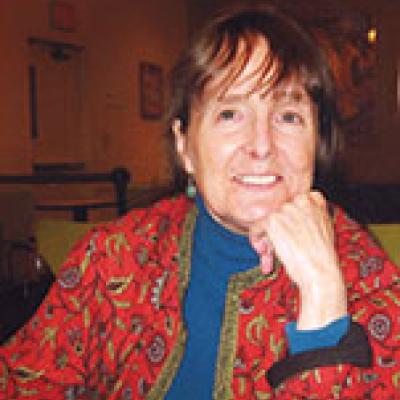
B.A. (Mathematics), Duke University
University of Freiburg, Freiburg, Germany
M.A. (Economics), New School for Social Research,
Ph.D. (Economics), New School for Social Research
Professor Joan Hoffman has been teaching at John Jay since 1972. Her fields of interest are sustainable economic development and economic stratification. She has published several articles on New York City’s Catskill Watershed collaboration and is currently writing a book on the topic. She has also published articles on topics such as criminal justice and sustainable development, the theory of economic change and crime, women and economic crime. She teaches Environmental Economics and Global Economic Development and Crime. She has lived in Germany, Mexico, Indonesia and Lebanon and has traveled extensively. These experiences help inform her analysis of economic development. She speaks German, Spanish and some French.
BOOKS
2010
The Cooperation Challenge of The Economics of and Protection of the Water Supply. New York . Routledge
1975
Racial Discrimination and Economic Development.
Lexington, MA: Lexington Books
BOOK CHAPTERS
2015
Fahrettin Okcabol , Joan Hoffman (2015), Institutional Accountability for True Green, in Cheryl R. Lehman (ed.) Sustainability and Governance (Advances in Public Interest Accounting, Volume 18) Emerald Group Publishing Limited, pp.123 - 160
2006
“Sustainable Development and Social Entrepreneurship: The NYC Watershed Collaboration , Networks & Social entrepreneurship” in Perrini, F (ed.)The New Social Entrepreneurship: What Awaits Social Entrepreneurial Ventures. London: Edward Elgar
ARTICLES
2018
The Invisible Political Economy of Algorithms; a Review of Weapons of Math Destruction by Dr. Cathy O'Neill. Working Paper Series: Department of Economics of John Jay College of Criminal Justice.
2017.
Environmental Justice Along Product Life Cycles: Importance, Renewable Energy Examples, And Policy Complexities. Local Environment. (June) Vol 0 Issue 0.0 Routledge DOI 10.1080/13549839.2017.1329285
Sustainability and inequality: confronting the debate. International Journal Of Urban Sustainable Development, https://doi.org/10.1080/19463138.2017.1333004
2008
“Watershed Ethics” in Encyclopedia of Environmental Ethics. Farmington Hills, MI: Gale Publishing
Watershed Shift: A preliminary indication of the impact of the New York City watershed agreement on employers of the Catskill/Delaware watershed economy.1997-2003. Ecological Economics vol. 68, issue 1-2, pages 141-161
2007
Green milieu: the milieu effects on sustainable development of watershed collaborations with a case study of the New York City watershed agreement. Proceedings of the Eco-Sud Conference Wessex Institute of Technology. Ashhurst, South Hampton, U.K.: Wessex Institute of Technology
2006
Census peek: collaboration in the New York City Catskill/Delaware watershed: case study 1990–2000 . Environment, Development and Sustainability on-line July 4, 2006.
Watershed collaboration conflict in the New York City Catskill/Delaware watershed in Dispute Resolution Consortium Compendium. New York: Dispute Resolution Consortium
2005
Economic stratification and environmental management: a case study of the New York City Catskill/Delaware watershed. Environmental Values 14 pp.447-470
2002
Legal responsiveness: a contribution to a structural theory of economic crime. International Journal of Social Economics. Vol 30 (3) pp. 255-274.
2001.
Sustainable economic development: a criminal justice challenge for the 21st century.” Crime, Law and Social Change. Vol 34 No 3. pp 275-299.
2000.
Roots: indicators of sustainable development for New York City. Social Indicators Research volume 52, issue # 2, pp. 95-134
1998
Economic transformation, disentitlement and women's arrest for street crimes: New York City 1960-96 in Karmen,A. (ed.) Crime in New York City.
Maintaining the roots of economic development in an era of globalized production. Futures 29 (9) Pp.811-25.1998 * Anbar Award of Excellence (on web site for 5 years)
1997
Macroeconomic conditions and New York City women’s drug arrest rates: 1960-88. Social Justice 24 (1)P. 82-106.
1991.
Tradition and transformation in Bali, Indonesia in Review of Radical Political Economy 23 (3 & 4).1983
1983
Urban squeeze plays--New York City crises of the 1930s and 1970s, Review of Radical Political Economics 15(2) p. 29-57.
1981
Business plans for New York, (with M. DeKadt and M. Edel) Social Policy. 12 (1).
1978
with Steve Rose. 1978. Corporate Profits and Accounting from a Radical Perspective. New York: Union or Radical Political Economy.
1975
Macropolitics and the economic crisis in Radical Perspectives on Economic Crisis. New York: URPE, The impact of economic crisis on women and minorities in Radical Perspectives on Economic Crisis. New York: URPE,.
BOOK REVIEWS
2015: Portney, Kent.E. 2013. Taking Sustainable Cities Seriously. Cambridge, MA: MIT Press on blog of John Jay College of Criminal Justice Sustainability and Environmental Justice webpage.
2014: Macy, Beth. 2014. Factory man. New York: Little Brown in John Jay College Department of Economics Newsletter
2014: Fallon, James. 2013, The Psychopath Inside Penguin Group in John Jay College Department of Economics Newsletter
WORKING PAPERS:
November 2015: 05-TPP: Omissions, Weaknesses, and Erosion and the Howevers . John Jay College of Criminal Justice Department of Economics Working Papers http://www.johnjay.cuny.edu/working-paper-series
Summer 2014: with Jessica Gordon Nembhard. 01-The Economics of Illusion and Environmental Justice John Jay College of Criminal Justice Department of Economics Working Papers http://www.johnjay.cuny.edu/working-paper-series
Fall 2011. 01- New York State’s Negligent Stewardship Calls for Sustainability Study John Jay College of Criminal Justice Department of Economics Working Papers http://www.johnjay.cuny.edu/working-paper-series